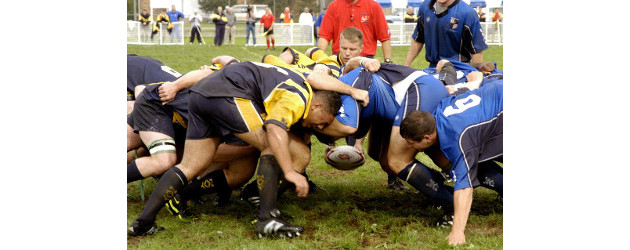Why rugby should embrace cannabis compound CBD
Hardly anyone knew about cannabidiol (CBD) just 10 years ago, besides dedicated cannabis researchers and a few informed users. But now, this non-psychoactive component of the plant is not only surging in popularity but making countries all over the world think twice about their anti-cannabis positions, which have become hardened in the past 100 years.
The initial appeal of CBD is that it has many of the medical benefits of cannabis (such as painkilling qualities and anti-inflammatory effects), but it is free from the psychoactive properties which have, rightly or wrongly, given cannabis a bad name, and a mostly unfavourable verdict in the court of public opinion. Abuse of psychoactive THC has been linked to mental health disorders including psychosis and paranoia.
But being non-psychoactive, CBD is cannabis perfection for many – they can get all the medical benefits, but without the cognitive slump that can come in the short run after using cannabis. This has several benefits: it’s possible to used CBD in the workplace and stay just as productive, or even become more productive. And CBD is also free of many of the side effects that come from opioid painkillers and, to an extent, non-steroidal anti-inflammatory drugs (NSAIDs).
Talking of work, is there any way that rugby players could benefit from taking CBD? If the evidence from the world of mixed martial arts (MMA) and the calls for medical cannabis in the NFL is anything to go by, then CBD may indeed have a place in rugby going forward.
CBD as a painkiller
Cannabis has long been known as a pain reliever, and CBD looks to be responsible for a considerable amount of the herb’s analgesic effects. There are two ways that CBD seems to influence pain perception: through adenosine receptors and vanilloid receptor 1 (TRPV-1).
Right now, the world has a huge and growing problem with opioid-based painkillers that are being prescribed in cases of chronic pain. While these drugs are often successful at managing pain, they come with many side effects and the addictive nature of them can cause patients to start taking more than they should, which leads to tolerance and a demand for stronger and stronger doses.
Unfortunately, strong opioid doses can be dangerous. In the US, a cumulative 40,000 people died from overdoses of recreational or prescription opioids in 2016, with abuse of a synthetic super-strength opioid called fentanyl responsible for many of these deaths.
However, there’s another way – with CBD. Not only are there signs that CBD can treat pain, but the cannabinoid may also help people to break free from the mental and physical chains of addiction. There is evidence that CBD can tweak with the pleasure-reward mechanisms in our body, because this function is modulated by the endocannabinoid system.
Side effects of opioids include dizziness, nausea and euphoria – none of which come from taking CBD, even in high doses. CBD can leave you feeling sleepy after a big dose but causes no significant side effects. Moreover, CBD has been found to be neither addictive nor dangerous.
With rugby players left to deal with chronic pain on a regular basis, similar to American football players, the pain relief offered by CBD – many users choose to vape high-strength CBD e-liquid for the speedy effects – could help them to treat pain and stay off opioids. A win-win.
Reduce inflammation with CBD
The endocannabinoid system and CBD could uproot all that we know about anti-inflammatory medicine. In having a direct line to the body’s immune system response, the endocannabinoid system has given researchers a brand new network to develop an anti-inflammatory treatment for, and one that is arguably better suited to controlling inflammation than any other.
The CB2 receptor modulates the endocannabinoid system’s signals to the immune system, and this receptor can be influenced by CBD – experts are undecided on if the CBD interacts with the receptor, or if it stimulates endocannabinoids that do. Either way, it works.
An anti-inflammatory product could be very helpful for rugby players in dealing with swelling, bruising and cuts from action on the field. Since there are cannabinoid receptors in the skin, CBD is well-suited to being used to manage inflammation, as it can be applied directly via a cream, gel or massage lotion. The cannabinoid can then instruct the skin to repair itself through the creation of new skin cells, or to stop swelling by regulating the inflammatory response which causes this reaction.
Using CBD to help with recovery
CBD can also help to soothe the muscles when applied liberally with CBD creams for pain. It works similarly to how CBD deals with inflammation – in this case, the CBD promotes pain relief, as well as relaxation and rejuvenation throughout the body. And if someone is experiencing pain in their leg, back, neck or anywhere else, they can rub the cream into this part of the body and enjoy an easing of symptoms in just minutes.
CBD as a neuroprotectant
Why would the United States federal government have a patent on CBD as a neuroprotectant if they didn’t think that there was promise? While cannabis has been smeared with neurodegeneration attacks over the years, new studies into CBD and cannabichromene (CBC) have found that cannabinoids can be used to protect and even regenerate the hippocampus through a process called neurogenesis.
The hippocampus is closely linked to neurodegenerative diseases and has been known to shrink in those with mental health complications – the brain’s autobiographical memory comes from the hippocampus.
With concussions and other types of head trauma all-too-common in the world of rugby, supplementing the body with a daily dose of CBD could ensure that the brain stays healthy, and limits damage caused after an injury.
CBD is legal!
In the United States, the United Kingdom and many other countries across Europe, Latin America and beyond, CBD products are legal so long as they are extracted from hemp. This is because hemp only contains small concentrations of THC, and therefore cannot be used for recreational purposes. Even massive quantities of a CBD product with traces of CBD wouldn’t induce a high, because the antipsychotic properties of CBD have an inhibit THC’s mind-bending effects.
The World Anti-Doping Agency (WADA) no longer lists CBD as a banned substance, after making a special exception for the cannabinoid when reviewing substances in late 2017 – CBD has been permitted since the start of 2018.
The contents of this article are meant to be informational and educational but should not be taken as medical advice. If you are in need of medical advice, consult a doctor.
Final thoughts
CBD clearly holds many benefits for the world of rugby, in terms of medication for inflammatory conditions and chronic pain, and to protect neural and general health. With the prohibition shackles being shaken off around the world, rugby needs to move with the times and embrace CBD vape oil and e-liquid and other types of CBD products.










